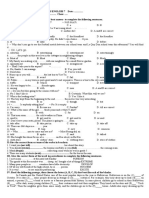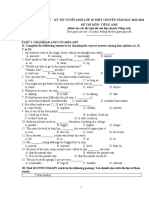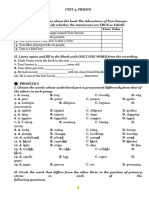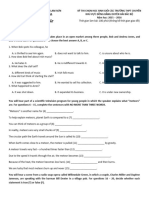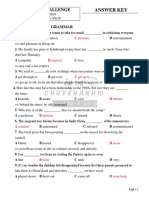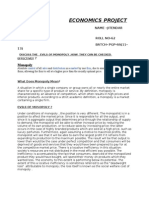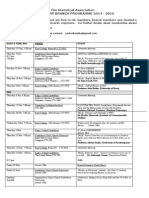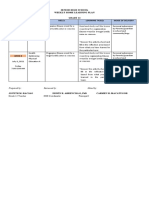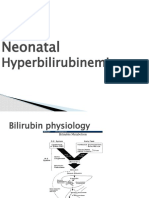Professional Documents
Culture Documents
Examen Ingles Acceso Mayores de 25 Años UNED
Examen Ingles Acceso Mayores de 25 Años UNED
Uploaded by
NOEMIOriginal Description:
Original Title
Copyright
Available Formats
Share this document
Did you find this document useful?
Is this content inappropriate?
Report this DocumentCopyright:
Available Formats
Examen Ingles Acceso Mayores de 25 Años UNED
Examen Ingles Acceso Mayores de 25 Años UNED
Uploaded by
NOEMICopyright:
Available Formats
INGLÉS C. A. D. – Septiembre 2016 - Tiempo: 60 min.- Diccionario: Sí.
- Consigne sus respuestas en la hoja de
lectura óptica. - Lea las instrucciones para rellenar la hoja de lectura óptica antes de comenzar. - Marque
claramente cada respuesta rellenando una única casilla. - Los errores no restan puntos.
Modelo E
George R. R. Martin is the creator of A Song of Ice and Fire, one of the most well-known book series
of today, which includes 1996’s ‘Game of Thrones.’ Martin was born in 1948, and grew up in New
Jersey (the USA). He has loved writing since he was young. Dying of the Light (1977) was his first
novel. One year later, he published his first instalment of the A Song of Ice and Fire series.
Martin’s early years were not spent far from home, but his imagination took him to many
places. He liked to watch suspense TV series. As he declared himself a conscientious objector during
the Vietnam War, he had to work with the Cook County Legal Assistance Foundation as part of his
alternative service from 1973 to 1976. After that, he spent two years as a college lecturer at Clarke
College in Dubuque, Iowa.
Maybe A Song of Ice and Fire was not a sudden success, but thanks to marketing, sales
increased. By the fourth volume, A Feast for Crows, Martin found his work at the top of best-sellers.
Thanks to the critically acclaimed television adaptation of Game of Thrones, whose creators are
David Benioff and D. B. Weiss, his literary works were introduced to a bigger audience, which
debuted in 2011 and eventually won a 2015 Emmy for Outstanding Drama Series. Martin has shown
no mercy to his own characters, killing off main characters and other favourite ones. However, not all
fans may be happy with such deaths.
1. ¿Cuál de estos títulos define mejor la información del texto?
a. David Benioff y D. B. Weiss, grandes creadores de literatura fantástica.
b. George R. R. Martin y su aclamada obra.
c. Un objetor ante la Guerra de Vietnam.
d. Los personajes favoritos de la audiencia y sus muertes.
2. ¿Cuál de estas frases NO es correcta según el texto?
a. La primera obra de Martin es de 1977.
b. Cuando Martin era pequeño, no sentía atracción por la escritura.
c. Martin trabajó de profesor en una universidad de Iowa.
d. Game of Thrones es una novela, adaptada a serie de televisión.
3. ¿Qué significa la palabra “instalment” (línea 4) dentro del texto?
a. instalación b. instrucción c. interpretación d. entrega
4. Según el texto:
a. A Martin le atraían las historias fantásticas desde muy pequeño.
b. A Feast for Crows es la segunda entrega de la obra de Martin.
c. A Martin le gusta acabar con la vida de algunos de sus personajes.
d. Todo el mundo disfruta con la muerte de algunos de los personajes de Martin.
5. ¿Por qué palabra se puede sustituir “eventually” (línea 11) dentro del texto?
a. finally b. firstly c. successfully d. in an event way
Elija la opción que sea más apropiada en cada pregunta:
6. Horror films are my favourite ones, what about _____?
a. yours b. your films c. your type d. films
7. What _____ Martina ______ about our secret?
a. do/know b. do/knows c. does/know d. does/knows
8. I _____ Greek food but my wife loves it.
a. love b. loving c. hating d. hate
9. Tonight’s football match ___ at 22.00 or at least that’s what I ______.
a. will start/thinks b. is starting/thought c. start/thinking d. starts/think
10. According to the messages I’ve received there_____ ten of us at party next Friday.
a. are b. go c. will be d. will go
11. _____ a lot of people who _____ against smoking in public sites.
a. There’re/is b. There is/is c. There isn’t/are d. There are/are
12. ‘Has it rained in Barcelona since I last _____ you?’ ‘No, it _____.’
a. met/didn’t b. met/hasn’t rained c. have met/didn’t d. met/hasn’t
13. ‘Did you phone me last week?’ ‘Yes, I _____ you last Tuesday.’
a. phone b. did c. have phoned d. phoned
14. On Saturday evening, I _____ some old friends of mine; I can’t wait.
a. visit b. am visiting c. have visited d. to visit
15. ‘_____ is making that strange sound?’ ‘I’m getting nervous.’
a. How b. Why c. When d. What
16. If we ___ on time, we ___ the beginning of the film.
a. haven’t arrived/didn’t miss b. don’t arrive/will miss
c. arrived/will miss d. arrive/wouldn’t miss
17. ‘What time is it?’ ‘It’s ______.’ (12:15 am)
a. quarter to twelve. b. quarter past fifteen.
c. quarter past twelve. d. quarter to fifteen.
18. In hospitals, sick people _______ smoke.
a. can b. mustn’t c. should d. shouldn’t
19. Transforme en voz pasiva la siguiente oración: Columbus discovered America in 1492.
a. America discovered Columbus in 1492.
b. Columbus was discovered America in 1492.
c. America was discovered by Columbus in 1492.
d. In 1492 was America by Columbus discovered.
20. Transforme en estilo indirecto la siguiente oración: ‘I’m reading my mail now’, she said.
a. She said she was reading her mail then.
b. She said she’s reading the mail at that time.
c. She said she’ll be reading her mail next.
d. She said she was reading now the mail.
You might also like
- Key of Test 5Document8 pagesKey of Test 5Phạm Nguyễn Tuyết HạnhNo ratings yet
- Pharmaceutical Selling SkillsDocument47 pagesPharmaceutical Selling SkillsJithu Bayi69% (13)
- C. to clue to: đầu mối: Part 1. Choose the word or phrase that best fits each blank in the following sentencesDocument9 pagesC. to clue to: đầu mối: Part 1. Choose the word or phrase that best fits each blank in the following sentencesBich Ha Do75% (4)
- Lesson Plan ON Assessment of Urinary SystemDocument11 pagesLesson Plan ON Assessment of Urinary SystemVeenasravanthi100% (1)
- TEST5Document4 pagesTEST5Xuan Xuan NguyenNo ratings yet
- English Proficiency TestDocument13 pagesEnglish Proficiency TestPrimaNo ratings yet
- Documents Answer: A: Page 1 of 12Document12 pagesDocuments Answer: A: Page 1 of 12Hồng NgọcNo ratings yet
- HSG 8 anh -ĐỀ 5Document7 pagesHSG 8 anh -ĐỀ 5Ngânn Khánh ĐinhNo ratings yet
- Engleski Za Ostale Profile Literatura I Model Testa 1Document7 pagesEngleski Za Ostale Profile Literatura I Model Testa 1overtimemoreovertimeNo ratings yet
- Trung Tâm Anh NG Nhung PH M 27N7A KĐT Trung Hòa Nhân Chính - 0946 530 486 - 0964 177 322Document3 pagesTrung Tâm Anh NG Nhung PH M 27N7A KĐT Trung Hòa Nhân Chính - 0946 530 486 - 0964 177 322Trung PhamNo ratings yet
- Formative Test Grade 4Document6 pagesFormative Test Grade 4fitria utamiNo ratings yet
- Unit 4 Smart World 6Document5 pagesUnit 4 Smart World 6Vương DiễmNo ratings yet
- 2017 de Chinh Thuc HSGDocument12 pages2017 de Chinh Thuc HSGOliviaLeeNo ratings yet
- BD 09 ĐềDocument8 pagesBD 09 ĐềPhan TàiNo ratings yet
- Hung Vuong Phu Tho K10.de - OkDocument7 pagesHung Vuong Phu Tho K10.de - OkAnh ThưNo ratings yet
- Midterm PracticeDocument5 pagesMidterm Practicejhoody26No ratings yet
- Anh 7 (2017-2018) (Xong)Document2 pagesAnh 7 (2017-2018) (Xong)Hà AnNo ratings yet
- Workbook 7&8Document24 pagesWorkbook 7&8Andrea PrietoNo ratings yet
- Đề thi HSG anh 7 có file nghe đề 18Document5 pagesĐề thi HSG anh 7 có file nghe đề 18Diêm Công Lĩnh100% (1)
- Practice Test English Grammar Part 1Document5 pagesPractice Test English Grammar Part 1erwinNo ratings yet
- 4 Vĩnh Phúc 13 14Document5 pages4 Vĩnh Phúc 13 14Bún Chả CáNo ratings yet
- Unit 3Document6 pagesUnit 3LyNo ratings yet
- ĐỀ ÔN THI CHUYÊN ANH 5 FINALDocument20 pagesĐỀ ÔN THI CHUYÊN ANH 5 FINALhuyenlpNo ratings yet
- Challenge TestDocument5 pagesChallenge TestLạc đà sáu múi ẩn danhNo ratings yet
- n tập kiểm tra 1 tiết bài 12, 13, 14 tiếng Anh lớp 10Document8 pagesn tập kiểm tra 1 tiết bài 12, 13, 14 tiếng Anh lớp 10lan nguyenNo ratings yet
- Đề thi học kì 1 môn Tiếng Anh lớp 8 năm 2020-2021 có đáp án - Trường THCS Nguyễn Văn Trỗi (download tai tailieutuoi.com)Document8 pagesĐề thi học kì 1 môn Tiếng Anh lớp 8 năm 2020-2021 có đáp án - Trường THCS Nguyễn Văn Trỗi (download tai tailieutuoi.com)thanh trúc võNo ratings yet
- HSG 320Document8 pagesHSG 320Minh HiếuNo ratings yet
- Đề Thi Học Sinh Giỏi Số 3Document9 pagesĐề Thi Học Sinh Giỏi Số 3Bảo Anh NguyễnNo ratings yet
- Đề Chính thứcDocument12 pagesĐề Chính thứcTram Le Phuong MaiNo ratings yet
- Kiem Tra 1 Tiet Unit1014Document3 pagesKiem Tra 1 Tiet Unit1014Huong LeNo ratings yet
- Such.: Every Story Has To Have Two Things. What Are They?Document3 pagesSuch.: Every Story Has To Have Two Things. What Are They?SaidithNo ratings yet
- Final Test A2.1Document9 pagesFinal Test A2.1Coordinator Skills4lifeNo ratings yet
- Đê DX Duyên H I FinalDocument14 pagesĐê DX Duyên H I FinalViệt HoàngNo ratings yet
- ENGLISHDocument3 pagesENGLISHCrisvelle AlajeñoNo ratings yet
- Achievement English Test A2Document17 pagesAchievement English Test A2Alma VelazquezNo ratings yet
- Sample Test IIIDocument12 pagesSample Test IIIRajesh KumarNo ratings yet
- TA10 - Đề 09 + KEYSDocument10 pagesTA10 - Đề 09 + KEYSYep YupNo ratings yet
- Gen Ed Testpaper Sir JadeDocument16 pagesGen Ed Testpaper Sir JadeFaina Rose J. CasimiroNo ratings yet
- T94KEYDocument6 pagesT94KEYNguyên Hà NguyễnNo ratings yet
- A. Will Have Learned B. Will Learn C. Has Leaned D. Would LearnDocument4 pagesA. Will Have Learned B. Will Learn C. Has Leaned D. Would LearnĐăng NguyễnNo ratings yet
- Preferences QuizDocument5 pagesPreferences QuizNathanael Shane Bennet 0901100No ratings yet
- đề ktra 15 pDocument8 pagesđề ktra 15 pthuytramtran0245No ratings yet
- English Proficiency Test'Document12 pagesEnglish Proficiency Test'ailaine grace alap50% (4)
- Đê DX Duyên H I FinalDocument14 pagesĐê DX Duyên H I FinalLương Hiền VyNo ratings yet
- Test 02 (4 Skills)Document18 pagesTest 02 (4 Skills)HOA NGUYENNo ratings yet
- B. Science Fiction A. Action B. Horror C. Classical D. Rock D. Country B. On at B. Singing A. About D. Loves C. Doesn't Like B. Costume C. PlayedDocument2 pagesB. Science Fiction A. Action B. Horror C. Classical D. Rock D. Country B. On at B. Singing A. About D. Loves C. Doesn't Like B. Costume C. Playedkhuyen phamNo ratings yet
- 21 May 1Document10 pages21 May 1Trần HuyNo ratings yet
- REVISION FOR TEST 45' (1) - GRADE 8 (2017 - 2018) : I. Multiple ChoicesDocument4 pagesREVISION FOR TEST 45' (1) - GRADE 8 (2017 - 2018) : I. Multiple Choicesnhatminh2309No ratings yet
- Đề Khảo Sát Chất Lượng Học Kì Ii Môn Tiếng Anh 6 Họ và tên học sinh:………………………………………………………………………… Trường………………………………………............ Số báo danh………………………… Mã đề: 111Document2 pagesĐề Khảo Sát Chất Lượng Học Kì Ii Môn Tiếng Anh 6 Họ và tên học sinh:………………………………………………………………………… Trường………………………………………............ Số báo danh………………………… Mã đề: 111ngocanh212tbNo ratings yet
- De de Xuat Thi Dong Bang Duyen Hai Bac BoDocument9 pagesDe de Xuat Thi Dong Bang Duyen Hai Bac BoQuang HọcNo ratings yet
- Trung Hiếu 7CDocument7 pagesTrung Hiếu 7Ctrantrunghieu200411No ratings yet
- English Challenge (Key)Document5 pagesEnglish Challenge (Key)Thảo GiangNo ratings yet
- TH I Gian Làm Bài: 90 PhútDocument5 pagesTH I Gian Làm Bài: 90 PhútNguyễn Phương DiễmNo ratings yet
- Đê DX Duyên H I FinalDocument14 pagesĐê DX Duyên H I FinalOliver LeeNo ratings yet
- ENGLISH TEST - FebruaryDocument8 pagesENGLISH TEST - Februarynguyenanhquanz2412No ratings yet
- 1st Summative Test in in English 6 Q1 Answer KeyDocument4 pages1st Summative Test in in English 6 Q1 Answer KeyGessle GamirNo ratings yet
- The Courage That My Mother Had: For Numbers 11-23, Answer The Questions Derived From The PoemDocument5 pagesThe Courage That My Mother Had: For Numbers 11-23, Answer The Questions Derived From The PoemRichardArugayNo ratings yet
- Assessment: English Grammar Part I. Choose The Correct Word To Complete The SentenceDocument5 pagesAssessment: English Grammar Part I. Choose The Correct Word To Complete The SentenceMarian Paz E CalloNo ratings yet
- Đề thi tiếng anh cho by tham khảoDocument38 pagesĐề thi tiếng anh cho by tham khảotailieucuadoankyNo ratings yet
- Grammar TestsDocument10 pagesGrammar TestsDinah BC FernandezNo ratings yet
- Advanced Practice Test 4Document6 pagesAdvanced Practice Test 4Trang An ThuyNo ratings yet
- Practising Law Institute: Developments and Trends in Compensation Practices - Aftermath of EnronDocument30 pagesPractising Law Institute: Developments and Trends in Compensation Practices - Aftermath of EnronTheodoros MaragakisNo ratings yet
- Business EthicsDocument4 pagesBusiness EthicsWilson MorasNo ratings yet
- Sample Motion For Appellate Attorney's Fees Florida State CourtDocument4 pagesSample Motion For Appellate Attorney's Fees Florida State CourtRf GoodieNo ratings yet
- Economics ProjectDocument3 pagesEconomics ProjectSunil BandiNo ratings yet
- Power Pro 2013Document28 pagesPower Pro 2013praunitNo ratings yet
- Laro NG LahiDocument5 pagesLaro NG LahiRav Evan VigillaNo ratings yet
- Unit 4. Music and Art Practice Exercises 2Document3 pagesUnit 4. Music and Art Practice Exercises 2Moon ChâuNo ratings yet
- Cyber Crime & Cyber Forensics - Advanced TopicsDocument19 pagesCyber Crime & Cyber Forensics - Advanced TopicsSekhar P100% (1)
- Order of The National ArtistsDocument34 pagesOrder of The National ArtistsRowell Digal BainNo ratings yet
- Electronics: Overview of Virtual Synchronous Generators: Existing Projects, Challenges, and Future TrendsDocument21 pagesElectronics: Overview of Virtual Synchronous Generators: Existing Projects, Challenges, and Future TrendsmartinmunozbaNo ratings yet
- Canterbury HA Programme 2014-15Document1 pageCanterbury HA Programme 2014-15Graham NobleNo ratings yet
- Buisness LetterDocument6 pagesBuisness LetterBrijesh KumarNo ratings yet
- For CompilationDocument41 pagesFor CompilationHanabusa Kawaii IdouNo ratings yet
- Month Wise Compliance ChecklistDocument2 pagesMonth Wise Compliance ChecklistDevrupam SHNo ratings yet
- Senior High School Weekly Home Learning Plan Grade 12 Date & Time Learning Area Melcs Learning Task/S Mode of DeliveryDocument6 pagesSenior High School Weekly Home Learning Plan Grade 12 Date & Time Learning Area Melcs Learning Task/S Mode of DeliveryDivine Rose GattoNo ratings yet
- Assignment Practical 1 ItDocument10 pagesAssignment Practical 1 ItSiti MaisarahNo ratings yet
- Lombardino's MenuDocument2 pagesLombardino's Menusupport_local_flavorNo ratings yet
- Neonatal HyperbilirubinemiaDocument22 pagesNeonatal HyperbilirubinemiaAnkur WadheraNo ratings yet
- Minimal Monthly Calendar A5 To A4Document4 pagesMinimal Monthly Calendar A5 To A4AidaNo ratings yet
- Contemporary Philippine Arts From The RegionsDocument41 pagesContemporary Philippine Arts From The RegionsJohn LexileNo ratings yet
- Development of The Discovery of Cells: Alexis Abogado, Kyle Ilan, Rose Orbillo, Noelle Savilla, and Sheilla TabiganDocument6 pagesDevelopment of The Discovery of Cells: Alexis Abogado, Kyle Ilan, Rose Orbillo, Noelle Savilla, and Sheilla TabiganNoelle Mickaela SavillaNo ratings yet
- 2191-Article Text-8913-1-10-20230319Document8 pages2191-Article Text-8913-1-10-20230319khedidja attiaNo ratings yet
- Neilson Powless Indigenous Cyclist 2001013927 Article - and - Quiz PDFDocument2 pagesNeilson Powless Indigenous Cyclist 2001013927 Article - and - Quiz PDFEnrique CornejoNo ratings yet
- UT Dallas Syllabus For Ahst2331.002.11s Taught by Britten LaRue (bxl091000)Document13 pagesUT Dallas Syllabus For Ahst2331.002.11s Taught by Britten LaRue (bxl091000)UT Dallas Provost's Technology GroupNo ratings yet
- Narayana Notes2Document23 pagesNarayana Notes2DHEERAJ MLVNo ratings yet
- Case Study 02 - Centum WorkSkills India - Large-Scale Vocational Training For YouthDocument20 pagesCase Study 02 - Centum WorkSkills India - Large-Scale Vocational Training For YouthNeha RohillaNo ratings yet
- Information On Brine PeelingDocument4 pagesInformation On Brine PeelingIzyan Mohd SubriNo ratings yet
















